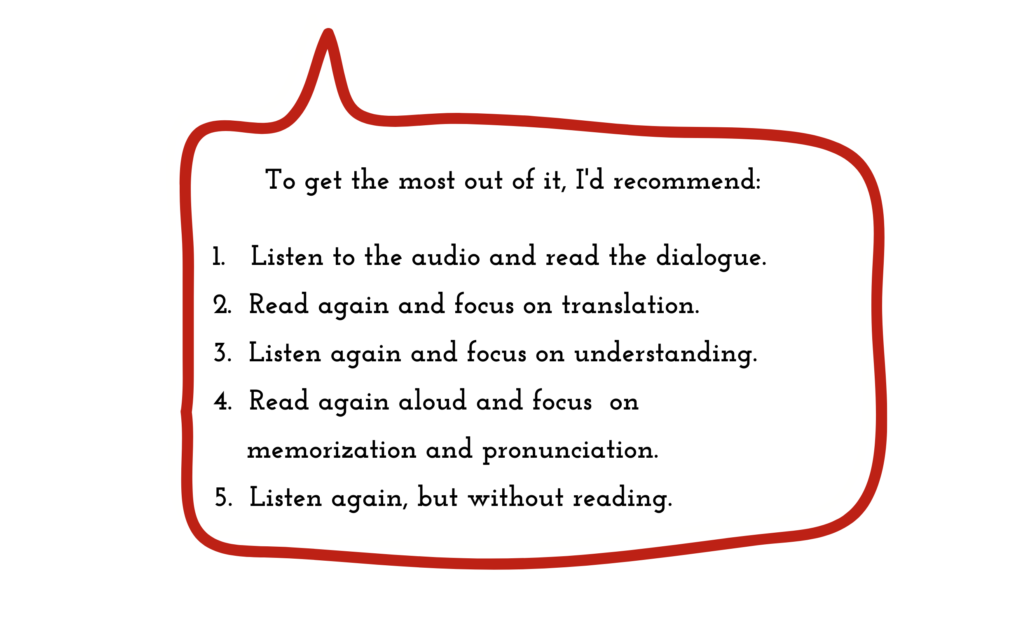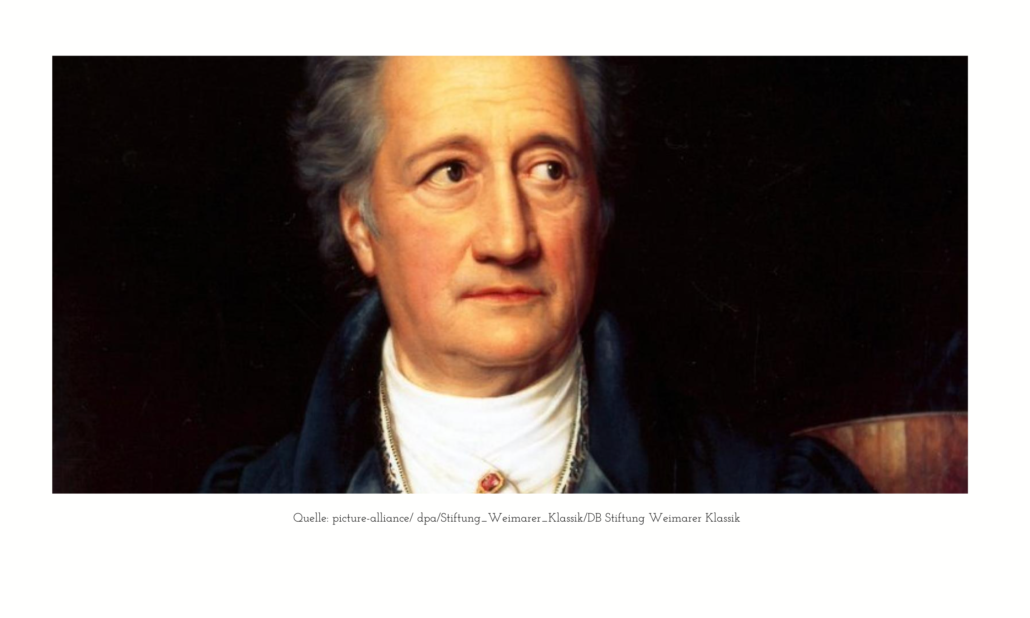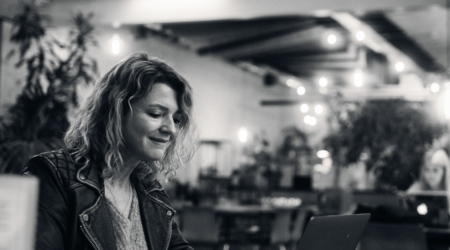Dear Germanee,
In this series, I’d like to give you a powerful introduction into German language by explaining 26 + 2 verbs, following the main-letters of the German alphabet.
Welcome, welcome to part 5!
Bist du bereit? Are you ready?
The next letter in our German alphabet, following the “C” is … bingo! … the “D“.
We pronounce it similarly to English.
In case, you’ve missed the C-post, explaining the verb campen, you can find it here: 26-2-german-verbs-in-action-part-4.
As a popular German example-verb starting with an D, I’d like to introduce you to:

We often use the phrase Ich denke … to express our thoughts, beliefs or opinion.
And also as a question Was denkst du?, to ask another person for his approval, opinion or just to politely include someone in an ongoing conversation.
Now, let’s have a look, how denken – as a regular verb – changes in action:
|
Verb basic form |
Singular |
Plural |
||||
|---|---|---|---|---|---|---|
|
ich I |
du you informal |
er/sie/es he/she/it |
wir we |
ihr you |
sie/Sie they/you formal |
|
|
denken |
denke |
denkst |
denkt |
denken |
denkt |
denken |
Right now, I’m wondering, whether you, dear Germanee, might find these verb-conjugation-tables a bit boring. But otherwise, ich denke, it can be useful for you to get more familiar with and reminded of these ending changes.
I’d like to show you, how denken is used even in a situation, where we’d usually more feel than think.

Shireen and Lukas, newly in love, are having a romantic dinner in an Italian restaurant.
| SHIREEN | Was denkst du, Schatz? What (are) thinking you, darling? |
| LUKAS | Du bist schön, Shireen. Und unser Leben ist schön. Ich bin so glücklich wie noch nie. Und du? Was denkst du? You are beautiful, Shireen. And our life is beautiful. I’m so happy as never before. And you? What (are) thinking you? |
| SHIREEN | Ich denke gerade an frisches Brot, Olivenöl, Burrata, Tomaten, Pasta und Shrimps. I’m thinking of fresh bred, olive oil, burrata, tomatoes, pasta and shrimps. |
| LUKAS | Waaas? Wie bitte?!? Oh, mein Gott, Shireen! Ich denke, du bist die unromantischste Person auf der Welt! What? Pardon?!? Oh my god, Shireen! I think, you are the most unromantic person on earth! |
| SHIREEN | Hahaaa, Lukas! Du bist so sensibel. Es tut mir wirklich leid, aber ich habe schrecklichen Hunger. Hahaa, Lukas! You are so sensitive. I’m really sorry, but I have (a) terrible hunger. |
| LUKAS to the waiter | Entschuldigung, haben Sie vielleicht schon Brot und ein bisschen Olivenöl für uns? Es ist wirklich dringend. Die Liebe meines Lebens hier verhungert. Excuse me, (do) have you maybe bred and a bit olive oil for us? It’s really urgent as the love of my life here is starving. |
| KELLNER (waiter) | Aber natürlich! Ich denke, das ist überhaupt kein Problem. Brot und Olivenöl kommen sofort. Sure! I think, that’s not a problem at all. Bred and olive oil will come immediately. |
| SHIREEN + LUKAS | Super! Vielen Dank. Great! Many thanks. |
| SHIREEN | Jetzt habe ich viele schöne Gedanken. Now have I many nice thoughts. |
| LUKAS | Ach, ja? Und was denkst du jetzt? Oh, really? And what (are) think you now? |
| SHIREEN | Ich denke, wie viel Glück ich habe. Ich habe Brot, Olivenöl und DICH, DICH, DICH. I think, how much luck I have. I have bred, olive oil and YOU, YOU, YOU. |

Ok. Ok, dear Germanee, ich denke, du denkst gerade: OmG, how cheesy! But, believe me, it’s indeed a challenge to stick to these few verbs you’ve learnt from previous posts and create a meaningful dialogue. Ich denke, that genius German, I’m going to tell you about now, would have been more talented to master it;).
Germany – das Land der Dichter und Denker
I’m sure you’ve heard that phrase before: Germany is considered as the country of poets and thinkers, das Land der Dichter und Denker.
Martin Luther, Gotthold Ephraim Lessing, Friedrich Schiller, Alexander von Humboldt, Friedrich Nietzsche, Hermann Hesse, Albert Einstein, just to name a few.
And of course, not to forget:

Johann Wolfgang von Goethe
(1782 – 1832)
I have to admit, although I did my masters in German literature, it took me many more years after university to fell in love with our famous Goethe. In fact, I had to travel to the city of Weimar, where Goethe lived most of his time. There I finally understood his true brilliance.
Johann Wolfgang von Goethe was a universal genius and a hedonist, who knew how to live life to the fullest. His poems, plays and novels prove only one of his many talents.
The scope of his collected works is up to 143 volumes, which include aside of his literature work, countless essays about scientific subjects, ranging from the theory of colors, his discovery of a small bone at the tip of the upper jaw, being a landscape architect to the morphology of plants.
Shortly after publishing “Die Leiden des jungen Werther”, “The Sorrows of Young Werther”, he became a rock-star of his era. I could probably continue my praises of this outstanding Denker for hours as there would be so many remarkable events and achievement. Right now, it comes to my mind that I should soon write an additional blog post about the brilliant Goethe in the category Kunst & Kultur, art & culture.
Ich denke, das ist ein guter Gedanke to close my today’s post about denken.
But … stop! Didn’t you too stumble about the fact, that all Dichter und Denker, I named above, were men?! No smart German ladies? I can’t leave it like this. Have you ever heard about Hildegard von Bingen, Dorothea Erxleben, Clara Schumann, Hannah Arendt? And of course, there would be many more to name and not least Angela Merkel.
Hab einen wunderbaren Tag und viele schöne Gedanken! / Have a wonderful day and many nice thoughts!
deine Tina Heimberg
P.s.: If you are too curious now to learn a bit more about Goethe and Weimar, please check out this link to a short video by Deutsche Welle: DW Weimar – Goethe, Schiller & Co. https://www.dw.com/en/weimar-goethe-schiller-co/av-18346649




Leave a Reply
Want to join the discussion?Feel free to contribute!